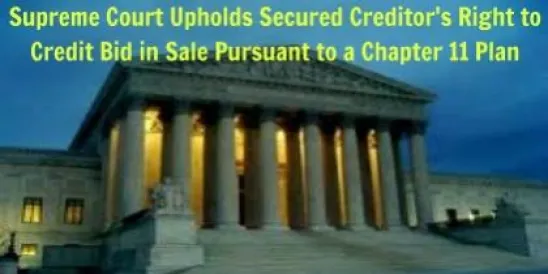On May 29, 2012, the United States Supreme Court upheld a secured creditor's absolute right to credit bid when a debtor files a Chapter 11 plan proposing to sell the secured creditor's collateral free and clear of the secured creditor's liens. RadLAX Gateway Hotel, LLC v. Amalgamated Bank, 566 U.S. ___ (2012). In just a little over one month since oral argument, the Supreme Court resolved a conflict between two circuit courts of appeal as to whether a plan could prohibit a secured creditor from credit bidding on its collateral at a sale. The Court's decision provides considerable assurance to lenders that they will have the ability to credit bid (unless for cause the bankruptcy court orders otherwise) in the event a debtor seeks to sell collateral through a Chapter 11 plan.
The Supreme Court has upheld a secured creditor's absolute right to credit bid when a debtor files a Chapter 11 plan proposing to sell the creditor's collateral free and clear of the secured creditor's liens
The Court's decision provides considerable assurance to lenders that they will have the ability to credit bid in the event a debtor seeks to sell collateral through a Chapter 11 plan
In an opinion authored by Justice Scalia, eight justices unanimously affirmed a decision of the Seventh Circuit that created a split between the Seventh Circuit on the one hand and the Third and Fifth Circuits on the other.
In RadLAX , the debtors' secured lender objected to the Chapter 11 debtors' plan, which proposed to sell the debtors' property free and clear of the lender's liens and to repay the lender using the sale proceeds. The bidding procedures proposed in connection with the plan attempted to prevent the lender from credit bidding its debt at the auction. The debtors claimed that the auction procedure provided the lender with the "indubitable equivalent" of its claims because it would receive proceeds of the auction. The Supreme Court noted that in order for a plan to be confirmable, it must be "fair and equitable with respect to each class of claims or interests that is impaired under, and has not accepted, the plan." For a secured claimant who has an impaired claim and who has not accepted a plan, fairness may generally be met in one of three ways: (i) the claimant's lien securing the claim is retained; (ii) the lien is removed, and the claimant may credit bid on the now "free and clear" property at auction; or (iii) the claimant realizes the "indubitable equivalent" of the secured claim.
The debtors in RadLAX proposed a plan under which the objecting lender's lien would be removed as in option (ii), but the lender would not be permitted to credit bid. In this situation, the lender would have to either wait to see what other bidders paid through the auction process or would have to bid "real cash money" through the auction process if it wanted to retain its collateral. The Court indicated that this approach was "simply a nonstarter" and held that such bid procedures could not satisfy the requirements of the Bankruptcy Code.
By rejecting an interpretation "contrary to common sense," the Supreme Court has reinstated some level of predictability to sales proposed as part of a Chapter 11 plan.



 />i
/>i

